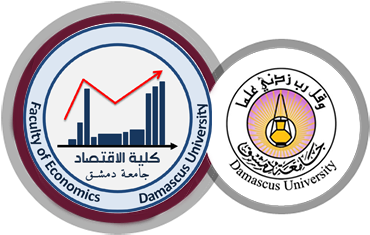|
الجمهورية العربية السورية
|
|
|
جامعة دمشق
|
|
كلية الاقتصاد
|
|
قسم المحاسبة
|
بحث بعنوان
أثر مقررات بازل في المعايير الدولية لإعداد التقارير المالية ودورها في تحسين جودة الأداء في المصارف السورية الخاصة التقليدية
أطروحة مقدمة لنيل درجة الدكتوراه في المحاسبة
إعداد الباحثة
ميساء محمد تيسير صابرين
إشراف
الأستاذ الدكتور علي يوسف
2024 م
الملخص
اختص البحث بدراسة دور تطبيق معايير التقارير المالية المتكاملة مع مقررات لجنة بازل للرقابة المصرفية في تقييم الأداء المصرفي، وذلك من خلال دراسة حالة تطبيقية على المصارف السورية الخاصة التقليدية خلال الفترة قبل تطبيق المعيار رقم (9) للفترة (2015-2018) وأثناء التطبيق للفترة (2019-2022)، وفي سياق ذلك استهدف البحث دراسة الآثار المتوقعة من تطبيق المعايير الدولية لإعداد التقارير المالية الصادرة بالتوافق مع مضامين مقررات بازل في تحسين جودة الأداء والحد من المخاطر التي تتعرض لها المصارف من خلال دراسة وتحليل مؤشرات تقييم الأداء المصرفي، ولتحقيق هذه الأهداف تم اختبار مجموعة من الفروض التي ترتب عليها مجموعة من النتائج أهمها: وجود فروق معنوية موجبة ذات دلالة احصائية بين تطبيق المعايير الدولية لإعداد التقارير المالية الصادرة بالتوافق مع مضامين مقررات بازل وبين تحسين مؤشرات الأداء لدى المصارف السورية الخاصة التقليدية، جهة ارتفاع مؤشرات الربحية المتعلقة بالعائد على الموجودات وصافي الفوائد المقبوضة، وارتفاع مؤشرات كفاية رأس المال باستثناء مؤشر (رأس المال إلى حقوق الملكية)، مقابل وجود فروق معنوية سالبة ذات دلالة إحصائية تمثلت بانخفاض نسبة السيولة بالليرة السورية ونسبة المؤونات المكونة لقاء الديون غير المنتجة للتسهيلات الائتمانية ونسبة رأس المال إلى حقوق الملكية.
واقترحت الباحثة في ضوء هذه النتائج مجموعة من التوصيات أهمها: ضرورة العمل من قبل المصارف السورية على تطوير نظم حديثة تتماشى مع المتطلبات التي يحتاجها تطبيق المعيار رقم (9) وخصوصاً نموذج الخسائر المتوقعة، مع تدعيم القواعد الرأسمالية لهذه المصارف باعتبارها خط الدفاع الأول عن المودعين، العمل على تعديل التعليمات الرقابية السورية الخاصة باحتساب كفاية رأس المال مع بدء العمل بتطبيق معايير بازل3 وفق مراحل محددة، والسماح بترخيص لشركات تعنى بالاستعلام الائتماني لبناء قاعدة بيانات شاملة تُسهل عملية التصنيف الائتماني لزبائن المصارف.
الكلمات الرئيسية: لجنة بازل للرقابة المصرفية، معايير التقارير المالية الدولية، مقررات بازل3، المعيار رقم (9)،
التصنيف الائتماني الداخلي، الخسائر الائتمانية المتوقعة، إدارة المخاطر المصرفية.
Abstract
The research is concerned with studying the role of the application of the International Financial Reporting Standards (IFRS) and the resolutions of Basel Committee on Banking Supervision in evaluating the banking performance, through an applied case study on traditional Syrian private banks before the application of IFRS (9) for the period (2015-2018) and during its application for the period (2019-2022). in this context, the research attains to study the expected effects of the application of (IFRS) in accordance with the contents of Basel resolutions in improving the quality of performance and reducing the risks to which Banks are exposed to, which could be through the study and analysis of the indicators of banking performance evaluation. Consequently to achieve these goals, a set of hypotheses were tested, which resulted in a set of results, the most important of which are: The existence of statistically significant positive differences between the application of (IFRS) issued in accordance with the contents of Basel resolutions and the improvement of performance indicators of traditional Syrian private banks, in terms of high profitability indicators related to return on assets and net interest received, and high capital adequacy indicators except for the index (Capital to Equity), Versus the existence of significant differences Represented by the decrease in the liquidity ratio in Syrian pounds, the ratio of provisions formed against non-productive debts of credit facilities, and the ratio of capital to equity.
In light of these results, the researcher proposes a set of recommendations, the most important of which are: the need for Syrian banks to develop modern systems in line with the requirements needed to apply IFRS (9) especially the expected losses model, while strengthening the capital bases of these banks as the first line of defense for depositors, working to amend the Syrian regulatory instructions for calculating capital adequacy with the start of work to apply Basel III standards according to specific stages, and allowing a license for companies concerned with credit registry in order to build a comprehensive database facilitating the credit rating process for banks customers.
Keywords: Basel Committee on Banking Supervision, International Financial Reporting Standards ( IFRS(, Basel III resolutions, IFRS (9), Internal Credit Rating, Expected Credit Losses, Banking Risk Management.
|
|
|
Syrian Arab Repuplic
|
|
Damascus University
|
|
Faculty of Economics
|
|
Department Accounting
|
The Impact of Basel Decisions on International Financial Reporting Standards and their Role in Improving the Quality of Performance in Traditional Syrian Private Banks
Degree of Ph.D.in Accounting
by
Maysaa Sabreen
Supervisor
Prof. D. Ali Yusef
2024






